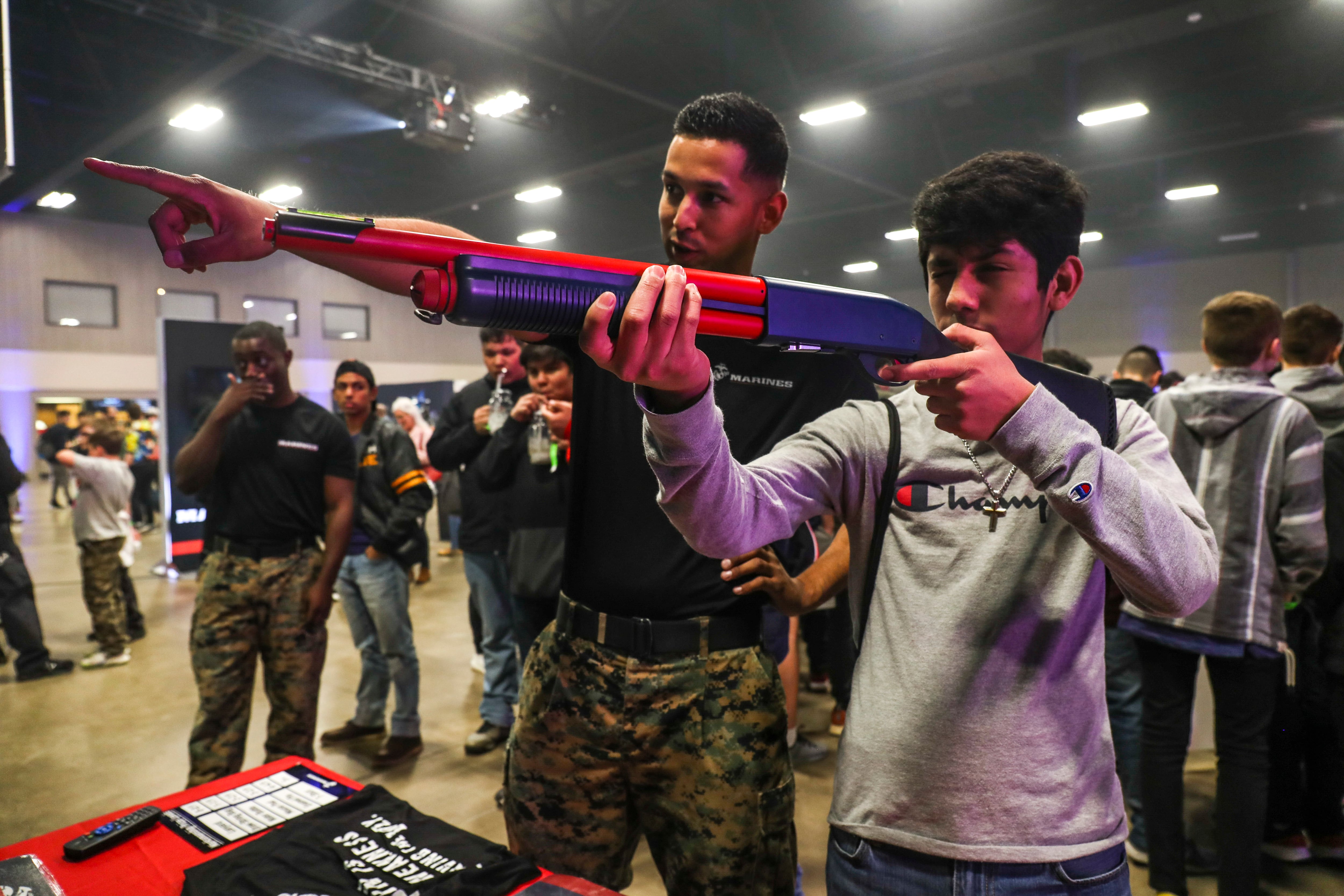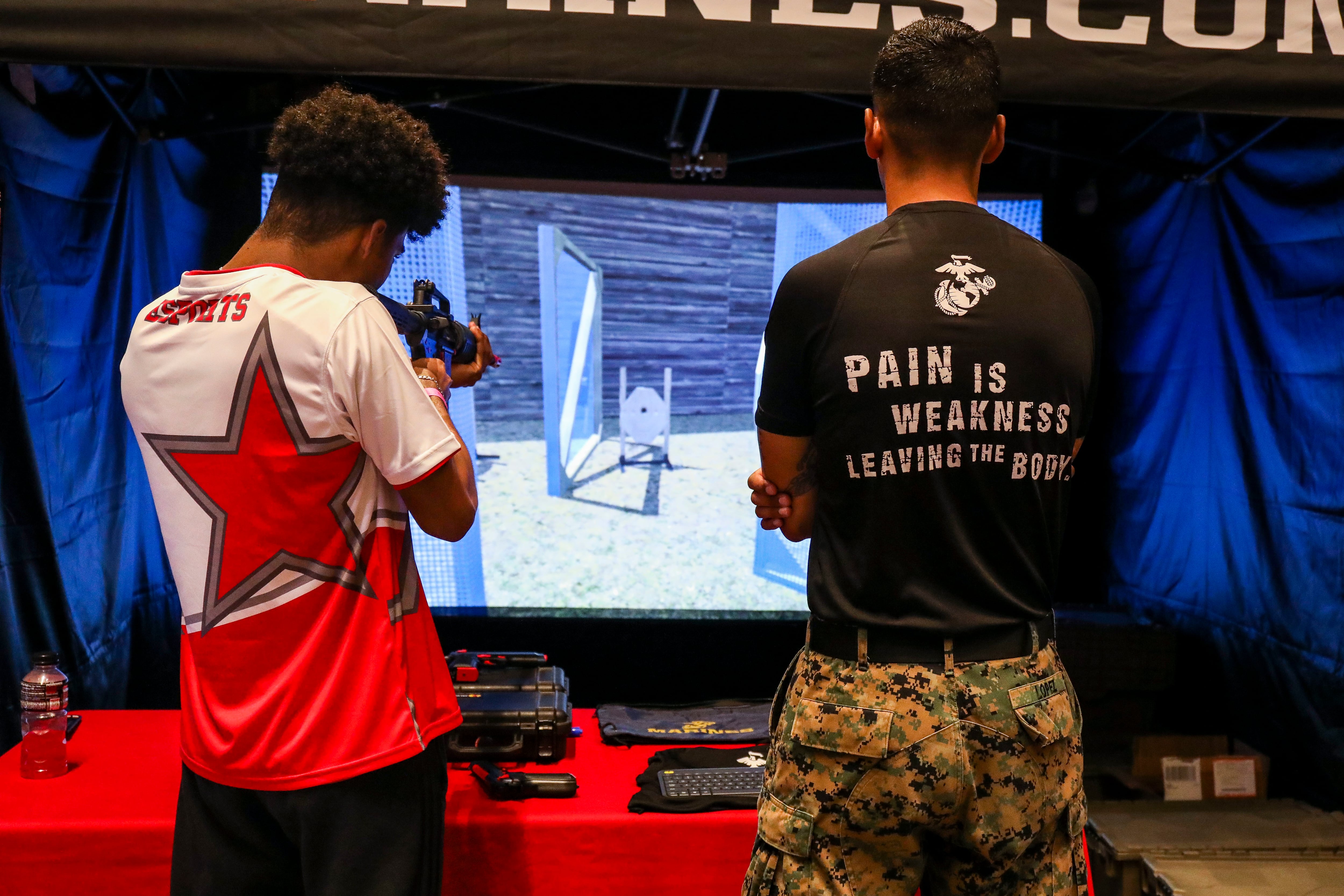A Marine corporal systems operator patrols through thick brush at night with her squad on a large remote island somewhere in the Pacific when she catches an incoming enemy patrol rapidly barreling towards her unit.
Through a small eyepiece feeding imagery from a reconnaissance drone overhead, the corporal spots six light-skinned armored vehicles carrying a platoon size element and heavy weapons 20 kilometers ahead.
Outgunned and dismounted, the systems operator pulls out a handheld tablet and plots friendly positions and communicates with a Marine armored reconnaissance vehicle parked at an outpost nearby.
The corporal requests the recon vehicle to fire off a swarm of loitering munition suicide drones to her position. As the drone munitions appear overhead, the corporal takes command in a hand-off between vehicle and ground operator.
While controlling a swarm of 15 drones, the Marine corporal uses a remote device similar to a video game controller to direct the loitering munitions over the enemy convoy.
The suicide drones slam into the enemy convoy creating mass casualties and destroying the vehicles. The Marine squad never spotted by enemy troops carries on with its patrol.
In this hypothetical future scenario, the Marine systems operator has destroyed several enemy vehicles using skills she learned as a professional gamer before deciding to enter the Corps.
Armed with “high acuity, a technical affinity, concentration, poise, focus," gamers and “digital natives grow up with multiple screens," said Marine Capt. Michael Maggitti, a marketing and communications officer with the 8th Marine Corps District. That gives them transferable skills to work in a number of job fields across the Corps from electronic warfare and tech related billets, he said.
The stereotype that gamers are basement dwelling loners not fit for military service is beginning to wear off as the Esports world continues to blow up around the U.S.
“There’s this stigma about that you’re just home alone in your basement playing games all the time — a sedentary lifestyle running on hot Cheetos and Mountain Dew, but that’s not reality,” Maggitti said.
The Corps’ future force of electronic warfare operators, cyber and data communications are “all online right now, they’re at these gaming events,” he explained.
The Esports world is a massive emerging market expected to bring in millions of viewers over the next several years.
But the Corps has been slow to tap into this potential recruiting bonanza — which might leave the Marines in the dust as the Navy and Army start stacking recruiting teams with gamers to attract tech adept people for a future force.
The Corps for now says it has no plans to follow suit with other service branches to create a recruiting Esports team.
The Marines, say “brand and issues associated with combat are too serious to be “gamified” in a responsible manner,” according to a recent Marine Corps response to questions by the Defense Advisory Committee on Women in the Services.
But the 8th Marine Corps Recruiting District — which overseas 13 Midwestern states — is headquartered in Fort Worth, Texas — the backyard of North America’s largest gaming stadium known as Esports Stadium Arlington.
Maggitti says the recruiting district has been making inroads with the local gaming community by partnering with the Arlington gaming stadium to create an onsite activation during a recent Smash Ultimate Tournament in December 2019.
The tournament allowed recruiters to make “face to face contact” and have “peer to peer” conversations with gamers.
“It’s a serious decision that person is making to join the Marine Corps,” and in-person conversations vice video games and online settings are the preferable way to have that discussion, Maggitti explained.
“We are actively seeking additional ways to engage our market in this space, evolving our tactics but being careful to avoid overly gamifying the experience of interacting with a Marine recruiter,” Gunnery Sgt. Justin Kronenberg, a spokesman for Marine Corps Recruiting Command, told Marine Corps Times.
“Embarking on the path to becoming a Marine is a serious decision for young men and women and we want to make sure those important initial conversations are happening in a professional setting,” Kronenberg said.
Maggitti says while the Corps is not currently creating an Esports team, the Texas-based recruiting district has found other alternative ways to reach gamers to include kick-starting an initiative dubbed the Marine Corps Academic Excellence Program.

For every student that gets an A on their report card or transcript, the student gets a free hour of gameplay at the Arlington Esports stadium.
The program helps “prioritize” studies over gaming and rewards success in the classroom, Maggitti explained.
The 8th recruiting district is making some early strides in the gaming community, but it’s still a hodgepodge effort where responsibility for potential gaming initiatives are placed predominately in the hands of local recruiters and recruiting commands.
“We know that our brand appeals to certain segments of the gaming population, which is why we have made consistent, targeted investments in the gaming space for years,” Kronenberg said.
But the Corps has pushed some other endeavors across the gaming world to include Marine Corps branded destination experiences on XBox Live
“Marine Corps Recruiting Command is conscious of how its efforts position our brand for marketing purposes, and together with its contracted advertising agency has put considerable effort into understanding the gaming space,” Kronenberg said.
Shawn Snow is the senior reporter for Marine Corps Times and a Marine Corps veteran.




